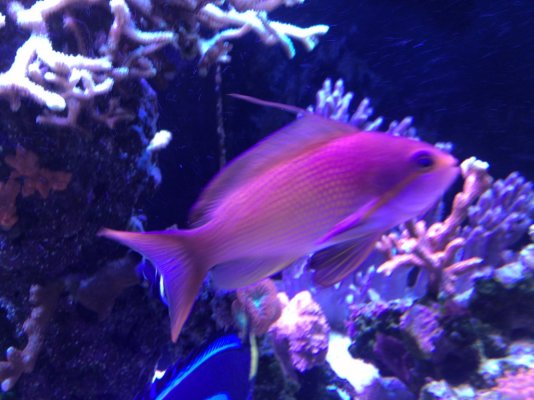- Joined
- May 31, 2017
- Messages
- 1,930
- Reaction score
- 2,140
I have three lyretail anthias. Medium size.
I've had one for about 6 months, about 2 months ago I added three more. Two females and one male. The male didn't make it a day.
Shortly after i added the three the one I had came up with tail fin eaten almost off. It's been doing fine and tail growing back good.
I woke up this am to find one with the tail almost completely gone and another one with 1/4 gone. The other one is a little bit bigger and I can see the tail fin shredded a little bit.
Fish list:
2 percula clowns, pair
1 tomato clown, owns the anemones in the tank
Male and female Lamarks angel. I suspect the male
1 6 line wrasse, I heard they can become agressive. Suspect
3 Blue reef chromis. One has turned male and has gone into seclusion as of late. Doing good, comes out to eat, but seems like he's been bullied
1 chalk bass
2 mated blue devil damsels that have been spawning for a couple years now. Interestingly enough the male was agressive until I put the Lamarks in the tank.
He lost a battle with the male lamarks and was pretty tore up. They settled things between themselves.
I never see one ounce of aggression in the tank besides the usual petty things that go on in a tank. Rare at that.
This is something that happens at night.
The fish I see active at night are the lamarks, the anthias and the wrasse.
I feed 3 times a day. Cuc is various snails and hermit crabs which all are getting low, so I've just ordered more.
I'm leaning to the lamarks with the 6 line wrasse a close second.
I've had one for about 6 months, about 2 months ago I added three more. Two females and one male. The male didn't make it a day.
Shortly after i added the three the one I had came up with tail fin eaten almost off. It's been doing fine and tail growing back good.
I woke up this am to find one with the tail almost completely gone and another one with 1/4 gone. The other one is a little bit bigger and I can see the tail fin shredded a little bit.
Fish list:
2 percula clowns, pair
1 tomato clown, owns the anemones in the tank
Male and female Lamarks angel. I suspect the male
1 6 line wrasse, I heard they can become agressive. Suspect
3 Blue reef chromis. One has turned male and has gone into seclusion as of late. Doing good, comes out to eat, but seems like he's been bullied
1 chalk bass
2 mated blue devil damsels that have been spawning for a couple years now. Interestingly enough the male was agressive until I put the Lamarks in the tank.
He lost a battle with the male lamarks and was pretty tore up. They settled things between themselves.
I never see one ounce of aggression in the tank besides the usual petty things that go on in a tank. Rare at that.
This is something that happens at night.
The fish I see active at night are the lamarks, the anthias and the wrasse.
I feed 3 times a day. Cuc is various snails and hermit crabs which all are getting low, so I've just ordered more.
I'm leaning to the lamarks with the 6 line wrasse a close second.














